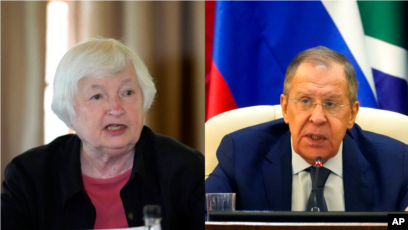JOHANNESBURG — This week saw Russian Foreign Minister Sergei Lavrov and U.S. Treasury Secretary Janet Yellen meeting officials in several African nations. U.S. Ambassador to the United Nations Linda Thomas-Greenfield also spent time on a tour in Africa, heading to Kenya after stops in Ghana and Mozambique.
Yellen focused on stronger democracies such as Senegal, South Africa and Zambia, while Lavrov also travelled to South Africa but included visits to authoritarian regimes in Angola, eSwatini and Eritrea.

Foreign relations expert Khaya Sithole told VOA most of Africa is “sitting on the fence.”
“If our Russian friends say, ‘we’d like to collaborate,’ we’re not going to say no. And if our American friends say, ‘we’d like to collaborate,’ we’re not going to say no,” he said.
The war in Ukraine has garnered the world’s attention for the last year with the U.S. and Russia eager to find allies on the African continent.
“You do not send a mere functionary. You send someone as senior as Lavrov, and you send someone as senior as Yellen, to be able to exhibit that we do actually take this partner seriously, and we want to keep them on our side,” Sithole said.
Sithole says the intentions of Moscow and Washington are clear: they both want to be able to count on Africa’s support during “significant events” in the future, especially in the event of third world war.
In Angola, Lavrov said good relations between Moscow and the continent are “not subject to geopolitical events, they are historic and based on a spirit of solidarity and support.”
He accused the West of using “colonial methods” to pressure developing countries to turn against Russia. Lavrov insisted Moscow is “committed to development in all areas” in Africa.
But international relations scholar John Stremlau told VOA Russian that trade with Africa is “minuscule,” and Moscow’s aid and investment on the continent’s almost non-existent, with its greatest presence being Wagner Group mercenaries fighting on behalf of dictatorships.
Stremlau said the U.S. providing billions of dollars to assist the continent in areas such as climate change and healthcare funding shows good faith, “but I wouldn’t exaggerate U.S. interests and influence” considering “the defiance that South Africa’s showing on Ukraine.”
The South African government has refused to condemn Putin’s invasion of Ukraine, and Pretoria recently announced joint naval exercises with Russia slated for late February.
Speaking at a joint presser with her Russian counterpart Lavrov, International Relations Minister Naledi Pandor said Africans shouldn’t be compelled to pick one side or another.
“One of the things we as Africans need to resist is this impulse of wanting to direct a double-standard form of international conduct toward us, that ‘What I do is okay for me, but you cannot do it because you’re a developing country, or you’re Africa,'” she said.
Stremlau says South Africa is straddling the fence by accepting help from Washington yet remaining “friends” with Moscow.
The U.S. is probably “sensitive” to these complexities, Sithole said, but is likely putting pressure on Africans behind closed doors.
“No country’s going to say, ‘It’s fine if you collaborate with our enemies; we’re still going to give you everything you ask for.’ It just doesn’t happen,” Sithole said.
Sooner or later, analysts say, Africa will have to choose one or the other: an alliance with a West or Russia, China, Iran and North Korea.q